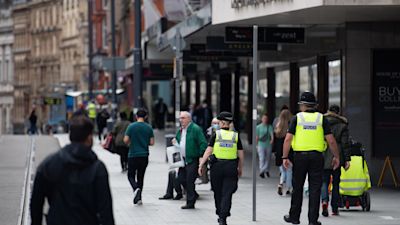Tighter coronavirus restrictions imposed on Birmingham after cases nearly triple

Tighter coronavirus restrictions have been imposed on Birmingham, Solihull and Sandwell after a rapid rise in coronavirus cases.
The Department of Health has announced from Tuesday (15th September) people should not host or meet people they do not live with in their home or garden, unless they’re in the same support bubble.
The West Midlands mayor, Andy Street said "The areas will now be escalated to an area of national intervention, with a ban on people socialising with people outside their own household."
"The ban will take effect from Tuesday 15th September, but residents are advised to avoid household mixing before then as it has been identified as one of the drivers of transmission."
Why are stricter measures coming into force?
Coronavirus cases have rocketed in recent days - with the infection rate in Birmingham almost tripling in the space of a week.
According to data from NHS Digital, the infection rate for the 7 days leading up to September 8th showed 78.2 cases per 100,000 people.
That rate was just over 30 per 100,000 for the 7-days previous.
Birmingham had already been classed as an area in need of "enhanced support" last month, after recording an infection rate above the threshold of 30 per 100,000 people.
The City Council even launched a whistle-blowing hotline and a legally-enforced crackdown on businesses flouting safety measures in an attempt to curb the rise in cases.
Despite the efforts, the rate has continued to rise.
Today's announcement comes after two days of discussions between Government and regional health and local authority leaders.
But, local politicians, including the Labour MP for Birmingham Yardley, have been expecting tougher restrictions to be imposed for days.
West Midlands Mayor Andy Street, who had travelled to London to meet with officials, said earlier this week additional restrictions were "very, very likely."
Meanwhile, cases in Sandwell doubled to 140 in the last week.
The rise was mainly seen in Smethwick and West Bromwich, and in the 20-40 age group.
How do Birmingham's cases compare to the rest of the country?
The recent infection rate put Birmingham third in the national table of local authority areas of highest infection rates, behind Bolton and Sunderland.
Bolton's seven-day rate currently stands at 143 cases per 100,000, and Sunderland is on 84, according to NHS Digital.
Why are cases rising?
Birmingham's Director of Public Health, Justin Varney, says the rise in cases is partially due to households meeting for private gatherings and parties at the end of August and across the bank holiday weekend.
He also added an increase in testing had also turned up more positive results.
Meanwhile, the Mayor said younger people "had got to take responsibility" with the biggest growth in the under-40s age groups.
It's after the largest rise in cases, locally and nationally, had been recorded among those aged 20-40.
Earlier this week Health secretary Matt Hancock warned against complacency around virus measures, particularly from young people, which could lead to a second wave.
Read more: